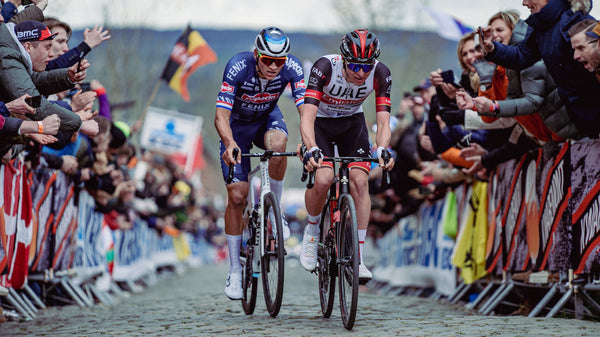This piece is an extract from the 2022 edition of The Road Book, cycling’s only almanack, edited by Ned Boulting. Now in its fifth edition, The Road Book features essays from some of the sport’s stars and some of its best writers, as well as a wealth of statistics, infographics, and profiles from this year’s road racing season.
The Road Book 2022 is available to buy now for £50 – click here to get your copy.
The finish of the men’s Tour of Flanders said a great deal about where we are in Classics racing in 2022. A lot was happening in the last few metres: Tadej Pogačar throwing his hands up in frustration at getting boxed in; Mathieu van der Poel wildly celebrating a second win; Dylan van Baarle giving the Ineos Grenadiers their first-ever podium at the race; Valentin Madouas of Groupama-FDJ reminding bike fans that a good rider on a great day can still beat great riders who are on good days…
A snapshot of the finish would be revealing not just for who and what was in the picture but also what was missing: any rider from Quick-Step Alpha Vinyl. The finishing straight of the Tour of Flanders, on the edge of Oudenaarde, is famous for being long, straight and wide, but you’d have to squint far, far into the distance to see the first rider from the Belgian squad. Their best on the day was Kasper Asgreen, a former winner no less, in 23rd place, who was technically contesting 15th place but looked far from motivated to do so. Fifteenth, 23rd, they’re the same thing when you’ve won the race before. It was the first time of the 20 occasions Quick-Step Alpha Vinyl has contested the Tour of Flanders that they didn’t get anybody into the top 13. They’ve won it eight times; five more times their best result was runner-up; 2007 and 2013 were the only previous occasions they’d not got at least one rider into the top ten.
In his book The Structure of Scientific Revolutions, the American philosopher of science Thomas Kuhn proposed that knowledge doesn’t evolve and advance in a linear way but rather undergoes periods of revolution in which new paradigms replace old ones.These paradigm shifts occur when people develop entirely new ways of thinking or seeing the world. You don’t have to, as Kuhn did, get too into explaining how Copernican astronomy supplanted Ptolemaic astronomy, or why Einsteinian physics necessarily proved Newton to be inaccurate, to understand the principle behind paradigm shifts: sometimes it’s just a case of…

